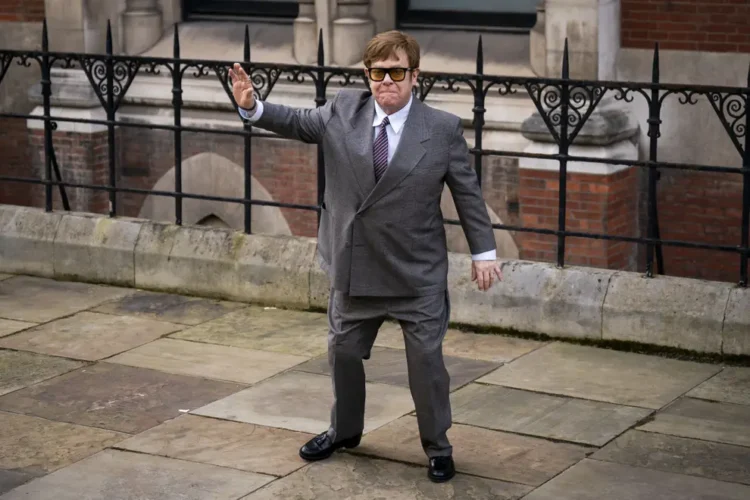By Sheila Mckenzie-
The legal suit brought about by Sir Elton John(pictured) and The Duke of Sussex’s privacy claim against the publisher of the Daily Mail is rejected “in its entirety”, brought “far too late”, and should be thrown out by a judge, the High Court has been told.
Legal representatives for the Associated Newspapers Limited (ANL) said legal challenges brought by a number of high-profile individuals, including Sir Elton John and Baroness Doreen Lawrence of Clarendon, have “no real prospects of succeeding” at a trial.
The publisher’s lawyers argued at the High Court in London on Wednesday that the cases should be dismissed, or a judgment made in its favour without a trial.
The judge is still deciding whether the case will go to trial.
The legal team for Harry and others described ANL’s bid as “hopeless, plainly inappropriate and suggestive of a tactical gamble” to avoid a full trial.
Harry, who was absent in court today alleges to have been the victim of unlawful or illegal information gathering and says he is concerned by the “unchecked power, influence and criminality” of ANL.
The duke and others, including actresses Liz Hurley and Sadie Frost and ex-Liberal Democrat MP Sir Simon Hughes, allege that ANL hired private investigators to place listening devices inside cars, “blag” private records, and access and record private phone conversations over a period starting from 1993.
The Daily Mail’s publisher argued that the group of seven high-profile individuals should have known, or could reasonably have found out, they may have had grounds for a case before October 2016 – six years before they pursued legal action against it.
The judge, who will ultimately decide if the case goes to trial, suggested they could reasonably have thought that someone close to them was leaking private information.
The allegations against Associated Newspapers Limited span a period from 1993 to 2011.
Mr Justice Nicklin later suggests statements made during an inquiry into media standards by Sir Brian Leveson in 2011 and 2012 may have reassured them that they weren’t victims of unlawful activity.
During the inquiry, Paul Dacre, who was editor of the Daily Mail between 1992 and 2018, and is now Associated Newspapers’ editor-in-chief, “unequivocally” condemned “phone hacking and payments to the police”, saying “such practices are a disgrace and have shocked and shamed us all”.
The counsel for Associated Newspapers at the time, Jonathan Caplan, also told the inquiry that “so far as [Associated] is aware no journalist at Associated Newspapers has engaged in phone-hacking”.
Mr Justice Nicklin says: “Looking at the claimant… they’re saying something’s gone wrong here, this is very suspicious.
“I have my suspicions but I have denials on oath from Leveson Inquiry.”
Lawyers for ANL, which is also the publisher of The Mail on Sunday and MailOnline, have “firmly” denied the allegations and argue that the “stale” claims have been brought in too late as they scrambled to have the cases thrown out. However, this is not the only challenge the Duke of Sussex and the other high-profile celebs face in coming out on victorious.
Mr Stephens explained: ‘There is evidence there, but the question for the judge will be ‘is it fair to let Prince Harry have access to this information or is it now so old that they shouldn’t have to do it?’
“The third piece is that there are 70 journalists involved in the allegations of wrongdoing and they are entitled to their privacy, meaning they shouldn’t have to be identified until the trial. This makes it industrial in scale and systemic.
“Phone hacking at the News of the World was among a small group of individuals. This is apparently a much larger group and this has the propensity, if they are able to bring it home, to be even more damaging than that.”
The legal suit comes more than a decade after the News of the World phone hacking scandal in 2011. The defunct paper was accused of illegally accessing the voicemails of murdered schoolgirl Milly Dowler, after reporters from the Rupert Murdoch-owned publication were alleged to have hacked the phones belonging to a number of celebrities too. It was a water shed moment in British journalism and exposed seriously unethical practices in some quarters of the media at the time.
Times are expected to have changed now, although bets on nobody’d life can be made in that respect. No evidence of phone hacking amongst journalists has emerged, but although this matter is from the past, the crucial element her is whether it will be admitted in court despite the passage of time, and what facts will thereafter be established in the case.




